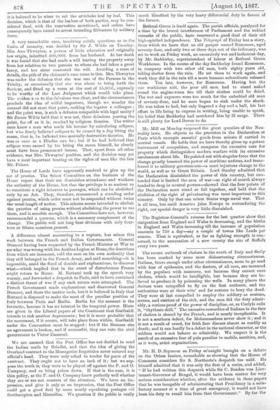Mr. Mill on Monday reopened the gieat question of the
Neu- trality laws. He objects to the provision in the Declaration of Paris which exempts enemies' goods from seizure if carried in neutral vessels. He holds that we have thereby given up a potent instrument of compulsion, and compares the excessive care for property which distinguishes modern warfare with its excessive carelessness about life. He pointed out with singular force that the change greatly lessened the power of maritime nations, and trans- ferred it to military governments—a most injurious change to the world, as well as to Great Britain. Lord Stanley admitted that the Declaration diminished the power of this country, but con- tended that it limited the area of war—as right of search always tended to drag in neutral powers—showed that the four points of the Declaration must stand or fall together, and held that the abolition of the right of privateering was most important to this country. Only by that can minor States wage naval war. That. is all true, but until America joins Europe in surrendering the right, our special danger is very little diminished.






























 Previous page
Previous page